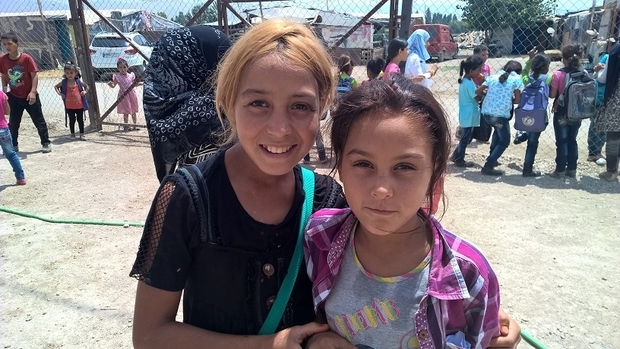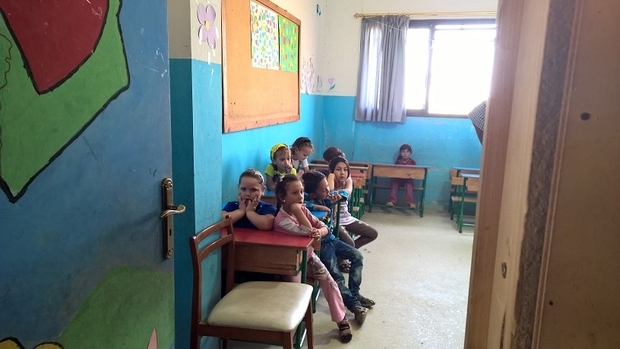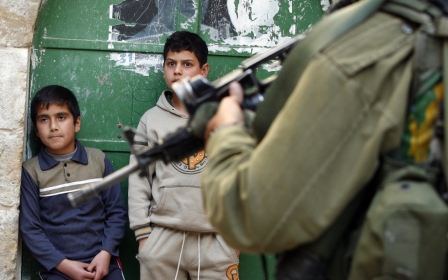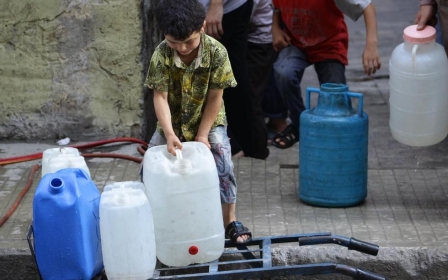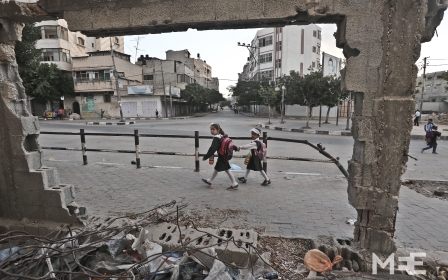For Syrian children, life in Lebanon is a struggle
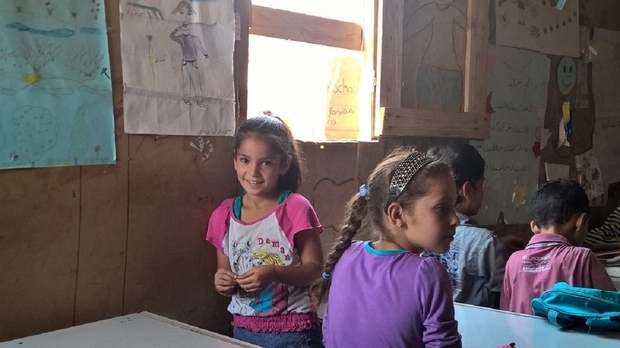
"Do you like Lebanon?”
“Mou ktir” - “not really” - that is how many of the Syrian children currently living in Lebanon reply, often along with an embarrassed smile and a shrug of the shoulders.
“I've been in Lebanon for three-and-a-half years,” says 12-year-old Ahmed*, who is originally from Rif Dimashq. He now resides in a refugee camp in Bekaa valley. “I don't have any Lebanese friends. If I make one, it only takes two or three days for him to start mocking me for being Syrian.”
According to UN statistics, from March 2015, 625,000 of the 1.2 million Syrians registered with the United Nations' refugee agency (UNHCR) are under the age of 18 – that is 53 percent of the Syrian refugees living in this small coastal country on the east shore of the Mediterranean. That does not include a growing number of displaced Syrians who are not registered by the UN.
The Syrian refugee crisis is the subject of much discussion in Lebanon and elsewhere, but few people mention the impact on Syrian children of living displaced. Yet the future of Syria will be shaped by these children who suffer in often unhygienic conditions, with severe psychological trauma and a cruel lack of access to education.
Unhealthy living conditions
“Whether they are living in tents in Bekaa Valley or in urban refugee camps, Syrian families are confronted by difficult living conditions that have an impact on their well-being,” says Nadia Farhat, a doctor with Doctors Without Borders (MSF) in Shatilla, a refugee camp close to Beirut mostly for Palestinians, which has taken in more and more Syrians in recent years. In these poor and overpopulated urban facilities, the chances of catching contagious diseases increase ten-fold.
“The living conditions take a heavy toll on health,” Farhat tells Middle East Eye. “In some cases there are 20 to 25 people living in the same room and this fosters contamination, especially as most people can't afford to buy water or medicine." She cites several cases of skin diseases, including scabies, among children.
To blame: Lebanese infrastructure. Several poor neighbourhoods in Beirut are supplied with salty, untreated tap water and electricity outages are common in most of the country. “The high pollution levels in these areas have significant consequences,” says Youssef*, another doctor at the MSF clinic.
“The humidity level in Beirut is very high compared to Syria, and refugees are living in very bad conditions in terms of hygiene,” Youssef explains to MEE. “We have noticed a geographic link between most of my 1,200 young patients who suffer from asthma and the fact that they live in poor, humid neighbourhoods such as Bir Hassan and Ouzai.”
Outside the city, access to healthcare is getting scarcer. Youssef recalls patients who came from as far as the town of Saida, 50 kilometres away. “The shortage of healthcare could have significant consequences for children's future health,” says the doctor.
“We can see two types of consequences on children's health,” he continues. “Firstly, there are mental consequences: the fact that children cannot play outside regularly with their friends is going to have an effect on their behaviour and relationships with other people. In medical terms, there can be side-effects to the medicines that they take regularly, such as cortisone. A chronic illness or malnutrition can affect their growth.”
Some serious pathologies develop more frequently than average among Syrian children, especially epilepsy and cerebral palsy, when women give birth in bad conditions or do not have antenatal care.
A worrying lack of access to education
Education remains a major issue for Syrian children. At least 312,000 Syrian children in Lebanon are of school age (between five and 16) – that is more than the number of Lebanese children currently registered in public schools, according to Suha Tutunji, the head of the education programme of a Syrian association called Jusoor. As a result, Syrian public schools are overcrowded and cannot look after all these children.
“If a child does not go to school by the age of 10, there is little chance of him ever going,” notes Tutunji. “If these children don't have access to school they will always have a sense of inferiority. That is very dangerous because it can lead to them being oppressed or manipulated when they get older."
The teaching in Lebanese schools, which is mainly in English or French, also raises difficulties for Syrians, who tend not to be proficient in these languages. “That hinders their progress and discourages them from going to school,” says Tutunji.
That is why the association Jusoor, which looks after 1,200 pupils in three schools in Lebanon, devised a curriculum combining the Lebanese course with basic English lessons to bring children up to school level before trying to re-introduce them into the Lebanese public education system. For without a state certificate, Jusoor pupils cannot get formal school qualifications. One of the organisation's main aims, therefore, is to prepare children for integration into the system in spite of its faults.
The organisation makes a point of employing Syrian teachers and principals.
“Children and their parents feel more comfortable with Syrian teachers,” Tutunji tells MEE. “They have a stronger connection than with Lebanese teachers and can talk to them about their problems. But emotionally it can be hard for teachers. At the start, a lot of them cried. But in my 25-year career in schools I've never seen teachers as highly motivated in their work.”
“It is hard to help children when you need help yourself,” says Hamad* with a sad smile. He is one of the teachers in the Jusoor school in the Joub Jannine Camp. “But they are our future, they are the ones who will rebuild Syria and I want to help them.”
A psychologically vulnerable and isolated generation
With all the difficulties in daily life, mental health considerations are often secondary for Syrian families in Lebanon, according to Michel Maragel, a psychologist and researcher for Himaya, a Lebanese NGO specialising in protecting children. Every year they treat hundreds of Syrian children.
Childcare professionals see the psychological effects of the situation in the behaviour of children on a daily basis. Nadia Farhat noted a large number of post-traumatic stress disorder symptoms in the children who come to the MSF clinic in Shatilla, including bed-wetting, stutters and fear of fireworks and other sudden noises. Tutunji has noticed that many children sometimes play violently, reflecting their experiences in Syria and Lebanon.
“One of our studies showed that for Syrian refugees, [mental health] is really a secondary issue, and that so long as they cannot satisfy their primary needs they can never invest fully in it,” explains Michel Maragel. “Furthermore, even though our services are free, the cost of travel is substantial for these people, who have virtually no financial liquidity.”
The mental health of parents has a major impact on children's well-being. Maragel says that the stress of refugee life in Lebanon can affect relationships between parents and children and give rise to physical abuse.
“If these same parents were in different conditions, many of them would be able to manage their children when they shout or do silly things,” says the psychologist.” But in light of the stress and trauma that they have been through, they find it very difficult to manage the situation and that leads to abuse of the children and breakdowns in communication.”
“I think we can talk of a completely lost generation,” he says gravely. “For a start, this is a population that has neither the legal right to exist on Lebanese territory, nor the right to work or receive help from the Lebanese government. The psychological repercussions are major. This creates significant suffering and we can envisage this having effects on generations who have endured this trauma and who, on top of that, are often faced with a population that rejects them.”
Maragel adds that most Syrians view Lebanon as a stop-off point on their way to more lenient lands, and that complicates their children's adaptation to their environment.
“In Lebanon, if we consider these criteria [regarding refugees' status in the country], this population is still in transit,” explains Maragel. “The discourse is that of a population in transit.”
“They do not invest in Lebanon as they would if they were planning to live there for a long time,” he says. “They always have one foot in, one foot out. That causes difficulties for the parents who, in a sense, are not going to have set plans, and also for children, who are permanently waiting for the next step, in a sort of limbo, which is a characteristic symptom of post-traumatic disorder. It's quite a heavy toll.”
Although many Lebanese cohabit easily with Syrians, there is an anti-refugee discourse at the national level that warns that this Syrian population poses a threat to the country's security and economic stability. The Lebanese national news agency regularly carries reports of Syrian children being raped or beaten by Lebanese citizens or found dead in unexplained circumstances.
As a result, many Syrians isolate themselves to avoid conflict with the local population. Hamad, the headmaster in Joub Jannine, recalls an incident in which one of his Lebanese neighbours called his four-year-old son a “dog”. He now fears for his family's well-being even though his own mother is Lebanese.
Adults' anxieties are felt by children. Forced to grow up too quickly, their future remains uncertain, whether in Lebanon, Syria or elsewhere.
Ghadi*, aged nine and a half, dreams of only one thing: going home to Zabadani, the Syrian city he left more than three years ago during a bombing campaign by the Syrian army. One of his friends died there. When he is asked what he wishes for from his future, the boy with the long eye lashes simply answers: “To stay alive, and for my grandfather to have some bread.”
*Not the person's real name.
This article was originally published on Middle East Eye's French page on 4 September 2015.
Middle East Eye propose une couverture et une analyse indépendantes et incomparables du Moyen-Orient, de l’Afrique du Nord et d’autres régions du monde. Pour en savoir plus sur la reprise de ce contenu et les frais qui s’appliquent, veuillez remplir ce formulaire [en anglais]. Pour en savoir plus sur MEE, cliquez ici [en anglais].


